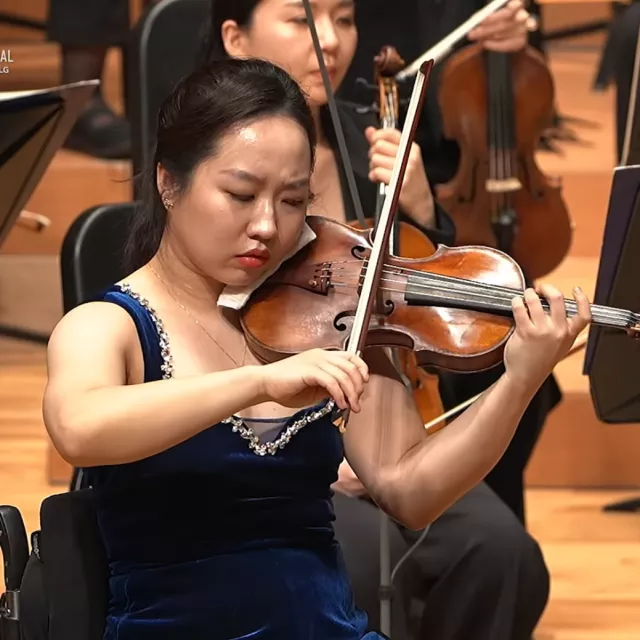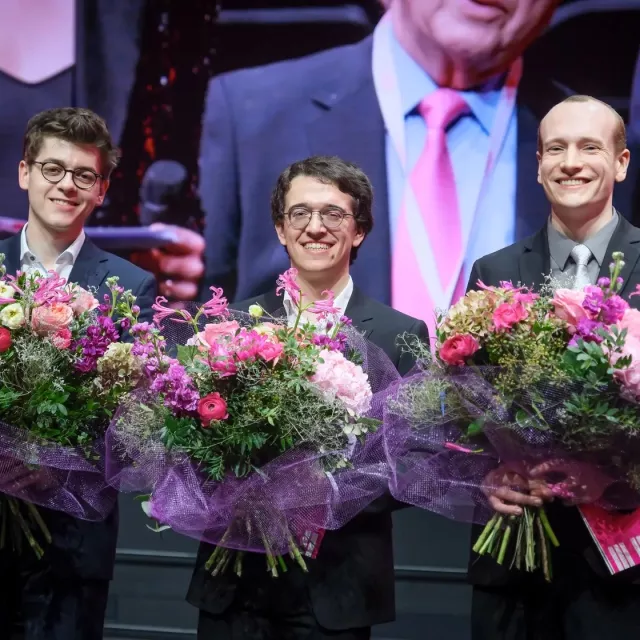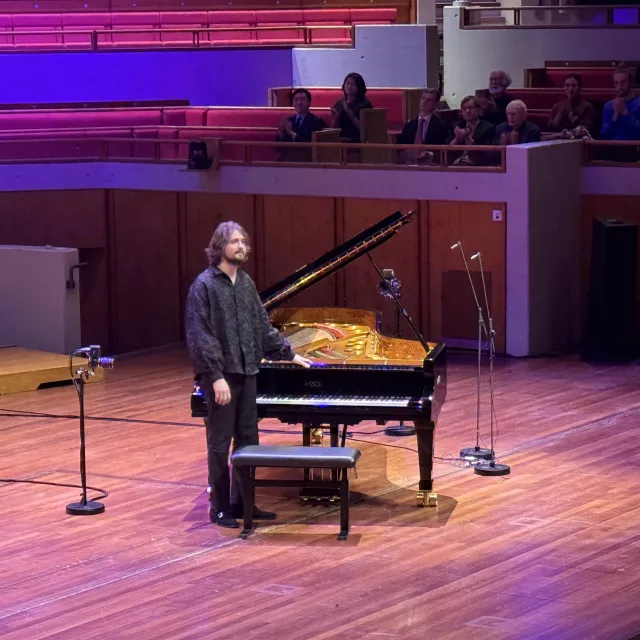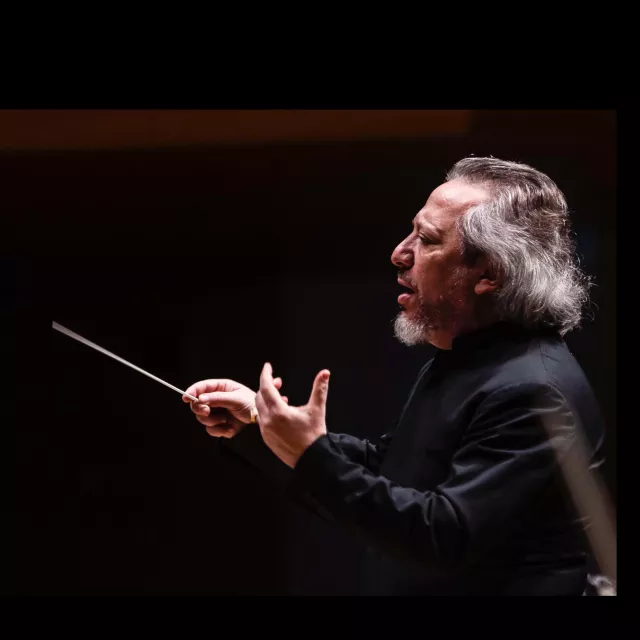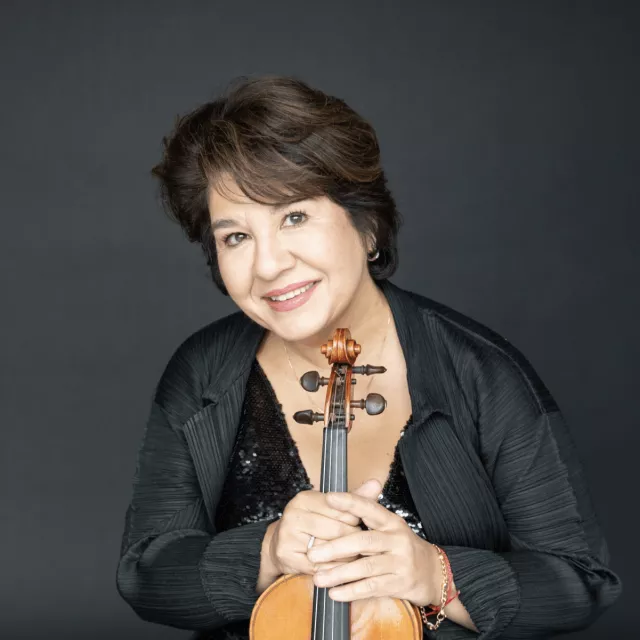Actions are more important than words

Pianist Sergey Belyavsky talks about Competitions, Climate, and Russian Artists
WFIMC: Do you remember the first time you played a competition?
Sergey Belyavsky: The very first time I played a competition was when I was a child. I performed at a local competition at the Central Music School in Moscow, and, to be exact, I played two competitions at the same time. The competitions were overlapping, and the finals of the first one took place later on the same day I was playing the first round of the other one. I played the first round of the local competition in the morning and got kicked out. Then in the evening I played the final of the Rotary Club International Competition in Moscow and was awarded the first prize. I was eleven or twelve years old, I think… and this says pretty much everything about competitions.
In a way, is this maybe symptomatic for you? Several times you won not First, but Second Prize, but every time not only Second, but also Audience Prize…
Actually, I was very happy about the 76th Geneva International Music Competition results in November 2022, but I thought: this cannot be a coincidence. Throughout the years, I participated and I got prizes here and there. But: I got Second and Audience Prize at the Maria Canals in Barcelona in 2014; Second and Audience Prize at the Liszt Competition in Budapest 2016, and now the same thing in Geneva… Among many other prizes of course. In any case, for me, the audience prize is always the most desired one.
When you compare these steps - the Maria Canals, the Liszt, the Geneva (and I think you did a lot more on the side) - has it become easier or more difficult over the years?
I became more aware of what is actually going on, of how I should present myself, which things I should avoid. Competition organizers are often trying to make competitions look more like concerts, in terms of the general atmosphere. But in the end, a competition is still a competition… I became calmer about people’s opinions as well. If some people don’t like what I do, especially if we talk about interpretations - it’s not my problem. If they like my playing – very well, but if they don’t – most likely I won’t be able to change their mind anyway. Why bother?
Do you have some special memories from these three competitions?
I loved all three places. I had been there before, and I also came back after the competition. I have not been back to Geneva yet, but I will be soon, in May 2023. Barcelona – I totally fell in love. At the time when I performed at Maria Canals in 2014, I was still a student at the Moscow Conservatory. Even though I had been to other countries before, but Barcelona was very special and it still keeps being on my mind today. Budapest is absolutely different, but very precious to me. At Liszt’s Competition 2016 I was there with my friends, whom I also consider as my second family. They brought some of their friends, so it was almost like a little fan club. Many local people, who had never been to a classical concert before, and they were all rooting for me- that was unforgettable.
As for Geneva, it just happened that my birthday was during the competition. I don’t care much about my birthday, for me it is a sort of an artificial timestamp that everyone agreed on, but still. I thought, the best birthday gift I could get was to be in the finals, which gave me an opportunity to perform at the wonderful Victoria hall, with the great Orchestre de la Suisse Romande
and with the amazing conductor Maržena Diakun.
WFIMC: Is your approach a different one when you play at a competition, compared to playing a concert?
Sergey Belyavsky: You have to be aware that playing at a competition is not just about playing one time and for the audience in the hall. Most of the time, the competitions are live-streamed, archived, and uploaded elsewhere, so of course it does put some pressure. As for the jury- they all have differences, they have opinions, but at the end they are only human beings. I always try to treat them as part of my audience.
Do you have to do certain things especially at a competition?
Yes, supposedly you have to maintain a certain balance in your playing to not to get too many people on the jury against you. So, I personally try not to go too extreme (in many senses). Maybe I have become somewhat more - you might want to call it conservative, in my playing, in my approach.
Lets go back to the beginning of your studies. What made you come to Israel to study?
After graduating in 2016 from Moscow I was thinking of several places to go. But at the time I chose to study with Prof. Arie Vardi. Tel Aviv is a very beautiful place to be, to live, and to study. I liked the diversity of the city, and I liked the climate a lot. It’s warm and there is a lot of sun, which is important for me. I really hate the climate in Russia, specifically in Moscow, especially in the winter. I still have a lot of friends in Tel Aviv, but the most important reason to go was, of course, Professor Vardi. I knew him from various masterclasses where we connected and I decided to study with him. He is a great teacher and an amazingly charming person.
Illia Ovcharenko was talking about you a lot- did you meet him for the first time in Tel Aviv?
I think I met Illia before, but I don’t recall where was it exactly. I definitely met him at the very well-known 2019 Paderewski Competition. We have a great friendship, with no problems him being Ukrainian and me being Russian. Firstly, I believe that we are human beings of Planet Earth, both making music. But of course, every day I am hoping to see the news about this terrible war being over and that Ukrainians are finally getting their country back.
Did you try the Rubinstein Competition as well while you were in Tel Aviv?
I am accepted to the next one… I was about to do the previous one, but that was the time when it was very hard to travel because of the Covid restrictions.
Just to finish the subject competitions. Can you tell for other youngsters: what is your recipe to approach a competition? How do you prepare?
Surely, I can speak about it. But I don’t think it will help anyone. Experiencing something over many years is not the same as telling a story to someone. If I were 18, if I were to start all over again, I probably wouldn’t do as many competitions as I did. There are plenty of smaller ones, mostly that are not at all significant. It’s not wrong to keep an eye on those, but you should rather focus on the ones that are meaningful for your career, like the big international ones - mostly the WFIMC Competitions. I probably spent too much time doing all these competitions. But do I have any regrets? No. Am I saying that I am not going to do any more? Also no. It can be a lot of fun. But it’s not for everyone. You should have a tough kind of character and ability to not to break under pressure. You have to be able to remind yourself: I didn’t pass today, but I´ll definitely pass tomorrow. You should not get frustrated if something does not go your way. There is absolutely no reason to get frustrated!
If you played in a way that you didn’t like and you didn’t make it to the next round, you actually got experience. If you played well and didn´t pass: you can go and ask some people, friends or jury, for their opinion, and you still get your experience. If you played well and advanced somewhat in the finals but did not get a prize because of the bad competition voting system, or because the stars did not align well enough for you, it’s still an experience. What to do with all that experience is up to you, of course, but there is always something to learn, to comprehend your musical path and life better, as long as you are able to think positive. That’s my conclusion.
You live now in Kansas City…
I have been here for a year. I am currently here as a student and it’s a great opportunity for me to learn from the Golden Prize Winner of the 11th Van Cliburn International Piano Competition Prof. Stanislav Ioudenitch at the Park University.
Even though the climate is not too pleasant in Kansas… hot in summer, cold in the winter?
It’s fine, not too cold, in comparison to Moscow. About the climate in Moscow- it´s not just a climate. It´s a lot of darkness that we have in the winter. Moscow is not the worst one, but it breaks you down in a way… I become depressed if I spend too much time there.
Actually, I have not been to Russia for over a year. I was there right before the war in Ukraine started, but since then, things have changed a lot also for me. From the point of view of the Russian government, a person who plays a benefit concert for Ukraine supports the opposite side and is considered a traitor and can end up in jail. With that perspective, I do not plan to go there before (at least) the current political regime is changed.
Did you also experience problems, or discrimination, because of your nationality?
I don´t consider any of it discrimination. Surely, there are some factors effecting me personally. The main issue is with the bureaucracy – visas, travel restrictions etc. Not the biggest deal, but it consumes a lot of my lifetime and it has become a lot harder to deal with. A lot of countries have made it more difficult and raised a lot of hurdles for visas to be issued to Russian citizens.
As for competitions, there was this example of the Dublin Competition 2022. They claimed for a while that they will not accept Russian citizens, but then they changed their mind. In my opinion, that was not a very smart thing to do, to say the least. If you decide to take a position, then keep that position! Obviously Dublin changed their position, because there were a lot of people against it, but they probably should have thought of it in advance..?
I am not saying that music or art are outside of politics. We know it is not. I wish it would be, but unfortunately it has not been that way. Having people like Gergiev, who has been one of Putin´s closest friends for so many years, people suddenly say: "No, we don´t want this person“ The point is that everyone knew all along about who he was, and accepted him, but now they blame him. Isn’t that a hypocrisy?
I don´t appreciate when people think that all Russians are the same. Yeah, some people think we all have the same opinion and we all are supporting the current war. And I understand why it happens. But there is a way to deal with it: you have to talk to people, and explain. It´s not too hard.
Competitions banning Russians: a complicated issue
In the wake of the war in Ukraine, several international competitions excluded Russian competitors- sometimes even candidates that had already been invited. Following appeals by the World Federation, most competitions retracted their statements and admitted Russians after all. Only a few kept their restrictions. While all of them have been criticized strongly, especially on social media, the issue often appears to be more complex than what it seems. Sometimes it is not even the management itself, but a government mandate that forces the competition to comply. In other cases, sponsors have threatened to withdraw their support and thus put an entire competition at risk.
The WFIMC continues to work on the issue with its members, trying to fight discrimination wherever it can.
WFIMC: Among Russian artists, some people are speaking out- some are not. Is it right to stay silent and keep on going as if nothing had happened?
Sergey Belyavsky: I think it should not be that everyone is forced to present their position. If you are willing, and if you want to- sure. If some people have a certain opinion about you- it is their right to have that opinion, the same way as artists have the right to choose whether or not to share their opinion. I think more important is what you want to achieve by voicing that opinion. For me, actions are more important than words. Those people who speak the least, but do the most, are really the bravest. Take Grigory Sokolov, for example. He doesn´t talk much. The other day, it was just casually announced before his recital that he will donate his fee for the concert to a Ukrainian foundation. He didn´t go on stage and made a big show of this. But there are people who do that, and they don´t actually help very much. It´s really the actions we need, not so much the talking.
You performed at a „Concert for Ukraine“ in Frankfurt right after the war started. What made you decide to do that?
That particular event was the first of quite a few, but it was probably the most exposed because of its media coverage. I was very happy and willing to do that. And I was very happy to share the stage with Alexei Gorlatch. Like me, he has been living abroad for a while. He has been living in Germany, but he was born in Ukraine and still has all his relatives there. It was not about him, or about me. But it was very symbolic for the two of us to go on stage together: To show that we can have a common understanding and common values. To try to make some peace by playing music. To show that we don´t fight each other just because we were born in different countries.
©WFIMC 2023
**********
Sergey Belyavsky lives in Kansas City, USA, where he is a student of Stanislav Ioudenitch at Park University. He previously studied with Elisso Vissaladze and Arie Vardi in Moscow, Arie Vardi in Tel Aviv, Lev Natochenny at the Kalaidos University in Zurich and Marian Ribykci in Paris. Since his debut at the age of 12, he has performed on the most prestigious stages in Russia, Europe and America, either in recital or as a soloist with orchestra. He has participated in many international competitions and has won numerous awards including 2nd Prize at the Franz Liszt Competition in Budapest, 2nd Prize at the Canals Competition in Barcelona, 3rd Prize at the Gina Bachauer Competition in Salt Lake City and several special prizes at the Paderewski Competition in Bydgoszcz, Poland. He has already recorded three CDs, the last of which is devoted to the 24 Études of Chopin.
**********

